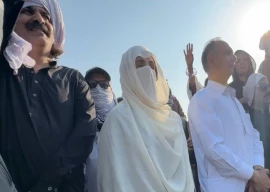
The daughter and the son-in-law of deposed prime minister Nawaz Sharif, through their counsel Amjad Pervaiz, challenged the trial court’s order of February 2 in the Islamabad High Court (IHC).
Through the order, Judge Muhammad Bashir had allowed recording statement of the two witnesses through video link at the Pakistan High Commission in London.
NAB had said that both the witnesses – Robert W Radley, the Principal at the Radley Forensic Document Laboratory, and Akhtar Raja, the Principal at the Quist Solicitors – are in the UK and could not come to Pakistan due to security reasons and ‘heavy engagements’.
Radley, being a forensic examiner, had revealed that the type of font used in trust deeds of two companies was Calibri, which was not commercially available before January 31, 2007, and that the documents were prepared and signed on an earlier date.
And, Raja is said to be a nephew of Wajid Zia, the head of the Joint Investigation Team (JIT) that probed the Panama Papers leaks on the Supreme Court’s directives.
Maryam was completely caught up in the fallout from the Panama Papers over the use of Calibri font. Safdar was a witness to the documents.
In the petition, the counsel said that the supplementary reference was not in consonance with the directions given by the Supreme Court, and the prosecution story in the supplementary reference was also different from the previous reference in material particulars.
According to the counsel, the reasons, stated by the two witnesses as excuse or inability to attend the court, are imaginary and not supported by any material. He has made the NAB chairman and the judge respondents in the petition.
As per the declaration attached with the expert report, he said, Radley declared that he may be required to attend the court for cross-examination and has not made his attendance conditional. He added the reason for excuse to attend the court is just an afterthought and prompted by mala fide intention.
Pervaiz said the option of forming a commission was available before the trial court, yet it proceeded to allow the examination through video link without any legal justification.
He argued in the petition that the legislature introduced a mechanism of examination through video link in the Anti-Terrorism Act, 1997, and the Family Court Act, 1964, during 2014 and 2015 respectively, and no such amendment has been brought as yet in the NAB Ordinance, 1999.
Hence, he said, the court had no jurisdiction to pass the impugned order.
While passing the impugned order, he said, the court has not kept in view even the minimum safeguards as to rule out the possibility of tutoring, coaching and prompting of the prosecution witnesses and has felt satisfied and contended with the examination of the witnesses through video link in the high commission without any representation of the two parties.
He added that the examination of witnesses through video link while sitting abroad would cause prejudice to the petitioners and the atmosphere would be conducive for committing perjury with impunity as witnesses would not be subject to the jurisdiction of any court of law.
Petitioners have prayed that the court set aside the order by declaring it illegal.
Or in the alternative, they prayed, the impugned order may kindly be modified with the direction for adequate representation of the petitioners during the examination of the witnesses at the high commission in London.



1732626034-0/BeFunky-collage-(92)1732626034-0-165x106.webp)



1732621030-0/Express-Tribune-(7)1732621030-0-270x192.webp)
1732622842-0/Express-Tribune-(9)1732622842-0-270x192.webp)

1725254039-0/Untitled-design-(24)1725254039-0-270x192.webp)






COMMENTS
Comments are moderated and generally will be posted if they are on-topic and not abusive.
For more information, please see our Comments FAQ